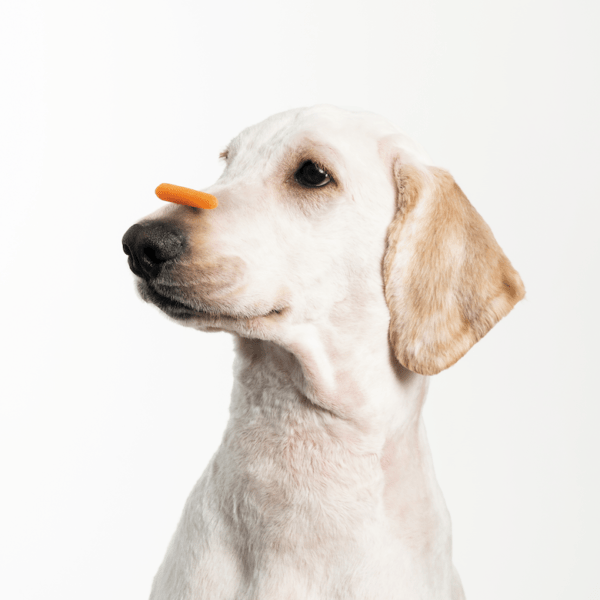Fresh, wholesome foods create optimum health for our canine companions, so why do “table foods” still get a bad rap? Throughout my years as a canine nutritionist, I’ve learned that some well-meaning veterinarians discourage their clients from feeding their dogs table foods, as it conjures images of greasy, unhealthy junk foods like pizza scraps, processed meats and high-fat fare that can trigger obesity, not to mention an acute attack of pancreatitis. However, I interpret table foods to just mean foods that weren’t manufactured by a commercial pet food company.
While dogs shouldn’t eat high-fat, processed table foods, they definitely should indulge in wholesome, low-fat, nutrition-packed table foods that promote optimum health.
You’ve likely heard the advice to “eat all the colors of the rainbow.” This is true for dogs as well. Fresh, vibrantly colored fruits and vegetables are low in fat and calories, nutrient-dense and packed with powerful anti-inflammatory and anti-cancer nutrients. They’re also delicious, so your dog will think he’s getting a treat, while you’ll know he’s really getting food therapy. Score!
These nutritious, low-fat table foods were favorites of my beloved dog, Chase. He loved to gobble them up, and I firmly believe they contributed to his long, healthy life. I hope they do the same for your dog!
Photo: Getty Images
Blueberries
Sharing a helping of blueberries with your canine companion might be one of the best things you can do for his health. Blueberries contain high levels of antioxidants, compounds that fight oxidation and free radicals in the body that can damage cells. Blueberries help fight against chronic diseases, including inhibiting the spread of cancerous tumors, reducing blood sugar levels, boosting brain function ability and decreasing the risk of metabolic syndrome.
Serving tip: Feed straight in your dog’s bowl, mix with his commercial food, or try topping them on a dollop of coconut-based yogurt for an extra special treat.
Green beans
Green beans might not have the colorful flash and aroma of, say, fresh ripe berries, but don’t let their laid-back look fool you. Green beans are packed with vitamins and minerals, including Vitamins A, B complex, C and K along with iron, magnesium, manganese and potassium. They’re also high in carotenoids such as beta-carotene that give carrots their vibrant orange color; however, in green beans, the orange is masked by high levels of chlorophyll, which impart a green hue. Several studies on animals have shown that chlorophyll may slow and prevent the growth of cancer.
Serving tip: Steamed green beans were one of Chase’s favorite treats, and I often fed them as a low-fat alternative to cookies. You can also toss cooked green beans in the freezer for a cold, soothing treat for teething puppies.

Photo: Getty Images
Carrots
The American Institute for Cancer Research lists carrots as a “cancer-fighting food,” thanks to a wide variety of antioxidants and phytochemicals. Carrots contain alpha- and beta-carotene that dogs can convert to vitamin A to help promote healthy immune function and optimum cellular health. Carrots also contain luteolin, a flavonoid that in laboratory studies shows anticancer effects. Carrots are rich in fiber, which slows the breakdown and absorption of its sugars. In fact, on the Glycemic Load scale, which takes into account factors including serving size when ranking how a food affects blood sugar, carrots rank just 6, making them a low GL food (foods that rank 10 or less are considered to have a low glycemic load).
Serving tip: Carrots make a satisfying plant-based chewing alternative and can help clean your dog’s teeth without fear of breakage. A big dog can likely handle a whole carrot, while “baby carrots” are better for small dogs. Very small dogs can indulge in an appropriate-sized slice. Monitor your dog to avoid a choking hazard.
Pears
Chase loved the succulent sweetness of a ripe, juicy pear, so I didn’t tell him that he was also getting a healthy dose of fiber to help regulate his digestion and lots of antioxidant Vitamin C to bust free radicals and promote healthy cells. Thanks to their high-fiber content, pears have a low GL of just 4, so this sweet indulgence actually helps to balance blood sugar. Feel free to
experiment with different varieties. There are many types of pears with different textures and colors, each offering a different combination of health-promoting plant chemicals.
Serving tip: Slice into an appropriate portion size for your dog. Don’t peel the pears, as the skin contains about 6 to 20 times more beneficial compounds than the flesh.
Red bell peppers
These sweet beauties are rich in antioxidant vitamins A and C, as well as folate and potassium. They also contain a variety of anti-cancer phytochemicals, including luteolin, quercetin, capsiate, beta-carotene and lycopene. Left to ripen on the vine longer than the green variety, red bell peppers accumulate more than one-anda-half times the vitamin C and more than 10 times the beta-carotene as their green cousins. They even support healthy eyes with a generous dose of lutein and zeaxanthin.
Serving tip: Simply slice and serve as a sweet, tasty treat. Never feed spicy peppers, which contain capsaicin that can cause serious allergic reactions or gastric upset.
Have fun discovering even more low-fat table foods your dog will love. Hint: bananas, cucumbers, sweet potatoes … if it’s dog-friendly, it’s a go!
Read Next: Can Dogs Eat Corn? The Answer Isn’t As Simple As You Might Think